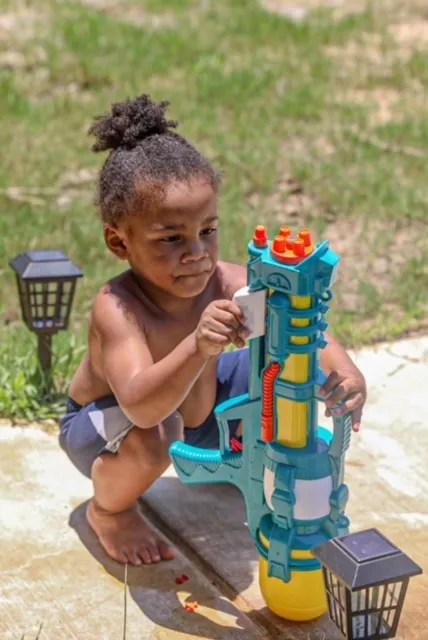
Tariq Williams/Kayla Mitchell

Audio By Carbonatix
Three-year-old Bakari Williams was playing in the splash pad at Arlington’s Don Misenhimer Park one day in early September. The next day, Bakari’s parents were rushing him to the hospital with a 103 degree fever.
Doctors at Cook Children’s Medical Center in Fort Worth diagnosed Bakari with primary amebic meningoencephalitis. This is caused by the brain-eating ameba Naegleria fowleri. The boy died Sept. 11.
Now, the family is suing to keep this from happening to others. Alongside their attorneys, Bakari’s parents held a news conference last week at the splash pad their son played at just weeks before.
Bakari’s mother, Kayla Mitchell, said it hasn’t been easy getting used to how quiet her home is without her son. His father, Tariq Williams, described his son as “a loving, energetic, passionate, sweet, beautiful, innocent boy. He didn’t deserve to die in this manner.”
Attorneys Stephen Stewart and Brian Hargrove are representing Bakari’s family in the lawsuit.
“It was hard for me not to sound emotional [at the press conference] because I have a 2-year-old,” Hargrove told the Observer. “Literally the weekend before I met [Bakari’s] family, I was with our daughter at our splash pad, you know? When this happened, I’m thinking, ‘That could’ve been my kid.’ It really hit home.”
Arlington Mayor Jim Ross told WFAA, “We absolutely failed.” Poor oversight was likely to blame, he added, explaining that the water quality wasn’t tested consistently and chlorine levels fell below minimum requirements.
“We shut down all of our splash pads,” Ross said. “We messed up. We screwed up, and we own it.”
Hargrove said he appreciates the mayor and other city officials owning up to the mistake that killed Bakari, but he insists the child’s death was preventable.
The splash pads are supposed to be tested daily. Hargrove said they didn’t know this when they filed the lawsuit, but the Don Misenhimer Park splash pad was tested less than 40 out of the 100 days it was open. Such gaps can be seen in water testing logs for the city’s other splash pads.
“This isn’t something complex. It’s a simple little water test. They’re required to do it daily, right?” Hargrove said. “To know they didn’t do it that many times, that rises to the level of what we call in the law gross negligence.”
“This thing was a ticking time bomb.” – Brian Hargrove, attorney
He added, “This thing was a ticking time bomb. It’s just, unfortunately Bakari, was the one that happened to catch it. It could have been anyone’s kid that was there, or any adult for that matter.”
In a Sept. 27 press release, the city of Arlington said records show that parks and recreation employees “did not consistently record, or in some cases did not conduct, water quality testing that is required prior to the facilities opening each day.”
The city and Tarrant County Public Health learned of Bakari’s infection on Sept. 5. The city closed all its splash pads that same day.
A Tarrant County Public Health investigation determined the infection likely either came from Bakari’s home or the Don Misenhimer Park splash pad. Then, on Sept. 24, the Centers for Disease Control and Prevention weighed in, confirming Bakari was infected at the city’s splash pad.
According to the CDC, Naegleria fowleri usually infects people when water containing the ameba enters the body through the nose. People are usually exposed to the ameba while swimming in warm bodies of freshwater, such as lakes or rivers.
But the ameba has also been found in inadequately chlorinated swimming pools or heated and contaminated tap water. It takes about nine days after exposure to see symptoms and besides Bakari’s, Tarrant County Public Health hasn’t received any other reports of Naegleria fowleri infections.
“We have identified gaps in our daily inspection program,” Deputy City Manager Lemuel Randolph said in the press release. “Those gaps resulted in us not meeting our maintenance standards at our splash pads. All of the splash pads will remain closed until we have assurance that our systems are operating as they should, and we have confirmed a maintenance protocol consistent with city, county and state standards.”
According to Hargrove, Bakari’s family wants to make sure this doesn’t happen to anyone else. “Part of what they want to prevent is another family having to go through this,” he said.
“We need to get the message out there,” Hargrove added. “In other cities, whether it’s Rochester, New York, or Richardson, Texas, they need to look at this and take this seriously because this was 100% preventable.”